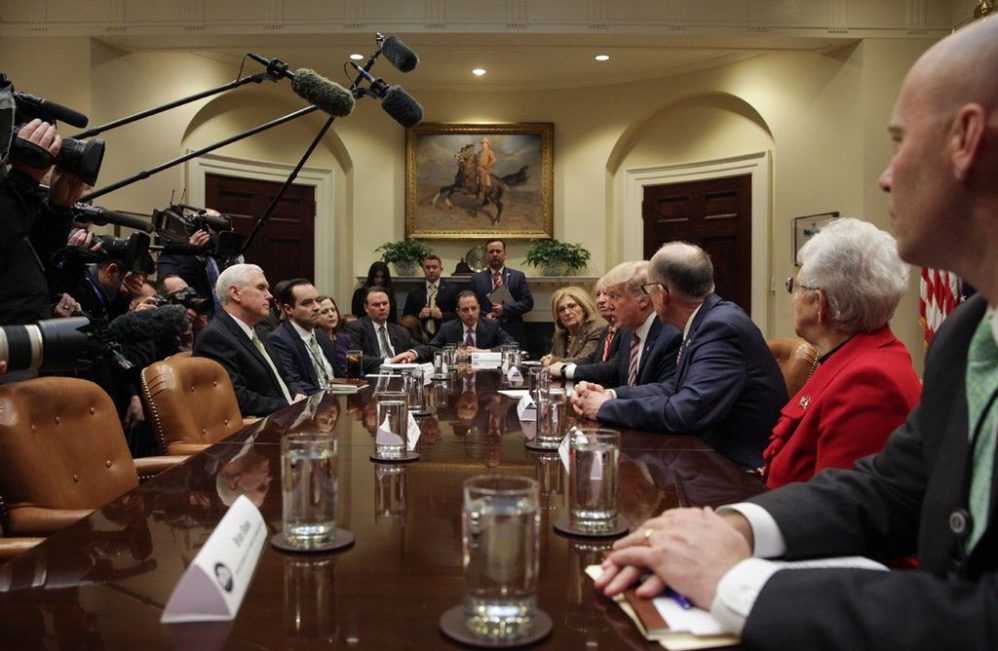Coming up with a bill that managed to get no bipartisan support, excited no part of their own party, writing it in secret without members even fully understanding it, then rushing to pass it shows a tone-deafness unlike any since Alanis Morissette.
The most amazing thing about this strategy is that Republicans willingly chose it. There was no urgency, no huge demand, no extenuating circumstances that forced them to rush a bill like this through. They could have just repealed and replaced later, fulfilling their promises to conservatives; or put together a well-thought-out, collaborative replacement bill later this year that reflected a great amount of research and consensus.
Or they could have done nothing, content that Obamacare would continue to implode on its own. Choosing none of these paths is baffling.
So what should they have done differently? Well, like most other parties, the most important thing for Republicans, as with most political parties in the world, is to stay in power. Approaching Obamacare as I describe below would maximize this goal.
That’s not to say it would lead to the best health-care bill possible, or even the best health insurance bill possible, and certainly not the best health care possible. But it would allow Republicans to fulfill a core promise to supporters, retain the legislative majorities necessary during President Trump’s term to pass other important things like deregulation, immigration reform, and tax reform, and likely minimize the long-term political fallout as much as one can when trying to reconfigure such a complex issue as health care.
1. Repeal Obamacare Completely, Effective in 2020
While not exactly a profile in courage, repealing Obamacare with a delayed implementation date serves a few purposes. Firstly, if fulfills promises Republicans have been making for nearly a decade. They have promised that, if they are in power, Obamacare, or any sort of mandated, government health-care, will not be on the books. It shows conservatives they can govern and will, even if kicking and screaming, make the hard choices needed.
It would also do a lot of good politically. While conservatives will, of course, object to any delay, I doubt it would lead to a large-scale revolt since Republicans will have kept their promises. They could also say a grace period is necessary for people to transition from exchange plans, insurance companies to create new plans, to create a new health-care paradigm, etc.
Slowly decommissioning Obamacare would do two other things. Firstly, it would help undercut the obvious arguments from Democrats, of people dying in the streets and the cruelty of people losing health insurance. Anecdotal appeals to emotion are guaranteed to follow any repeal or replacement, no matter how trivial.
When Democrats present these horror stories in the next few years, a party with a good, united message (let’s pretend this applies to the Republican Party) could simply respond that Obamacare is still in force, so all these tragedies are happening under Democrats’ health-care plan and that is precisely why they have repealed it. When insurers leave the exchanges because there is no future in them, most people don’t care about death spirals or lack of future profit opportunities, they just know that their insurer pulled the health plan and Republicans can say it was because of Obamacare’s failure, not in spite of it.
Secondly, because of this affix, very few people would face real consequences until well after the 2018 elections. While the media and their Democratic allies will pound home the horror of Obamacare repeal, most people, especially the vast majority of the country whose policies come through their employers, will notice very little consequence from unchanged policies. This will forestall for Republicans what happened to Democrats in 2010 so they can keep working majorities through President Trump’s term.
2. Immediately Stop Obamacare’s Medicaid Expansion
Medicaid expansion is responsible for most of the newly insured whom Obamacare advocates love to tout. Amazingly, many of these people were already eligible for Medicaid before Obamacare was law. The attention and outreach from Obamacare just moved them into the program.
Therefore, most of the low-hanging fruit is already enrolled in Medicaid. Freezing the program’s new enrollment means nearly everyone who wanted Medicaid now likely has it. No one will be kicked off, the rug won’t be pulled out from states that expanded, and very few people are likely to be negatively affected, especially if the economy continues to pick up steam.
But this will freeze both real and potential cost expansion through Medicaid, helping with the deficit, stopping the digging into our fiscal hole, and making future changes easier.
3. Vote Through Popular, Bipartisan Single-Issue Fixes
The biggest fallacy of this whole experience seems to be that Republicans need to replace a comprehensive monstrosity of a federal health insurance plan with another one. Instead, Republicans should take the much smaller parts of Obamacare people like and Democrats have constantly advocated for, and keep voting on them.
This is probably the least conservative part of my plan but very important politically. I am basing this on continuing Obamacare as-is versus implementing only certain parts, rather than the political bloodbath Republicans will face with a repeal and no plan or effort towards at least some replacement.
What ideas would those be? Well, tort reform and selling insurance across state lines are very popular conservative ideas that would likely sail through Congress and receive very little pushback from the American public. To make this work politically, Republicans would have to work with Democrats and not just put forth a Republican laundry list of preferred policies.
Therefore, things such as keeping people younger than 26 on their parents’ insurance plan should be included. While definitely infantilizing, it is lower-cost and probably wouldn’t be the hill most conservatives or insurance companies would be willing to die on.
Despite likely raising conservative and insurance company, it would likely be necessary to push three longtime themes of Democratic health-care dreams: guaranteed issue, no lifetime limits, and community rating. All are budget busting. All are extremely popular. None is particularly conservative. But not getting behind them in some way guarantees a political disaster in 2018/2020 akin to what Democrats went through a decade earlier. Who knows what new health debacle they will try to foist on the country if returned to power.
These Ideas Would Turn a Political Loss Into a Win
Furthermore, Republicans can make these ideas far more actuarily sound than they are now, keeping the political credit for pushing them while making them less likely to lead to the death spiral we are seeing now. Putting in a grace period after people sign up for insurance to use some or all of it would reduce the financial incentive for people to wait to sign up until they get sick or can exploit with pre-existing conditions.
Allowing insurance companies to consider more factors than age and smoking in their rate calculation, such as the U.S. Department of Health and Human Services’ decision to change the ratio of age-factor pricing from 3 to 1 to 5 to 1, would also help. Perhaps also raising lifetime and annual limit caps very high and starting a reinsurance or government-funded program for the small number of people that would exceed these new caps would reduce the actuarial risk on that to assist with insurance company pricing.
These policies would put Democrats in a huge political bind, similar to President Trump co-opting some of their issues in his campaign. Do Democrats vote against these things because they are now being proposed by Republicans? Because they aren’t liberal enough? Would Democratic members of Congress and senators in states Trump won be able to rationalize voting against guaranteeing insurance to those with pre-existing conditions after all this time saying it was Republicans who want people to die? Could Bill Nelson of Florida explain he voted against community rating, forcing older people to pay more because it might help Trump politically? Republicans could then be on the attack, hitting Democrats with their own words and threats.
Don’t forget, repealing Obamacare would change political reality. A Democrat landslide in 2018 or 2020 couldn’t just re-impose Obamacare. They would have to go through the entire process to put the law back in place. So while they may try to make it about how the Republican version of these issues is so much worse than what was in place, come 2020 none would be and a vote against them means Democrats, not Republicans, would be on the hook for failure to pass them, limiting the political damage. I find it hard to believe that some red state Democrats wouldn’t join Republicans to pass some of these much smaller bills, which would allow Republicans to claim a mantle of bipartisanship in their health-care bills that Democrats never could.
Republicans should have followed this kind of framework, and they still can. House Speaker Paul Ryan and other Republican leaders can say we tried a comprehensive replacement, the votes weren’t there, so instead we will keep the promise to our constituents, repeal, then try to pass replacement in smaller batches.
The political damage is already done. Now all they can do is try to salvage some goodwill and good policy outcomes as best they can. Repealing the Affordable Care Act, freezing Medicaid growth, then piecemeal replacement is the best possible plan to do so.





